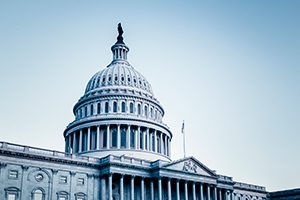Supreme Court Rules Against NCAA Rules Limiting Education Benefits Offered to Student-Athletes
 On June 21, the U.S. Supreme Court issued a narrow but significant decision in NCAA v. Alston. The Court unanimously ruled against the National Collegiate Athletic Association (NCAA), deciding that the NCAA’s strict limitations on education-related benefits that higher education institutions can offer to student-athletes violates federal antitrust law.
On June 21, the U.S. Supreme Court issued a narrow but significant decision in NCAA v. Alston. The Court unanimously ruled against the National Collegiate Athletic Association (NCAA), deciding that the NCAA’s strict limitations on education-related benefits that higher education institutions can offer to student-athletes violates federal antitrust law.
In the ruling, which was written by Justice Gorsuch, the court upheld lower court rulings that said the NCAA unlawfully limited competition for players by restricting institutions’ ability to offer better benefits. The decision explained, “By permitting colleges and universities to offer enhanced education-related benefits, its decision may encourage scholastic achievement and allow student-athletes a measure of compensation more consistent with the value they bring to their schools.” The court did clarify that the NCAA does have the authority to issue reasonable rules to protect intercollegiate athletics, but the justices went on to explain that the restrictions on athletes’ education-related compensation did not pass scrutiny under the Sherman Act, or the nation’s antitrust law.
The court rejected the NCAA’s calls for deferential treatment under the Sherman Act. As the decision explained, “To the extent [the NCAA] means to propose a sort of judicially ordained immunity from the terms of the Sherman Act for its restraints of trade — that we should overlook its restrictions because they happen to fall at the intersection of higher education, sports, and money — we cannot agree. This Court has regularly refused materially identical requests from litigants seeking special dispensation from the Sherman Act on the ground that their restraints of trade serve uniquely important social objectives beyond enhancing competition.”
Importantly, this ruling focuses solely on education-related benefits — such as scholarships for graduate school, payments for tutoring, or paid post-eligibility internships — and does not touch on other compensation rules mandated by the NCAA, including those related to “name, image and likeness” (NIL). The justices chose not to address this larger issue. That said, the ruling could open the door for other legal challenges against the NCAA.
Justice Kavanaugh seemingly invited such challenges in his concurrent opinion, in which he took a much harder line against the NCAA. Kavanaugh cautioned, “The NCAA’s current compensation regime raises serious questions under the antitrust laws.” He continued, “The NCAA couches its arguments for not paying student-athletes in innocuous labels. But the labels cannot disguise the reality: The NCAA’s business model would be flatly illegal in almost any other industry in America.”


